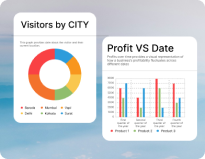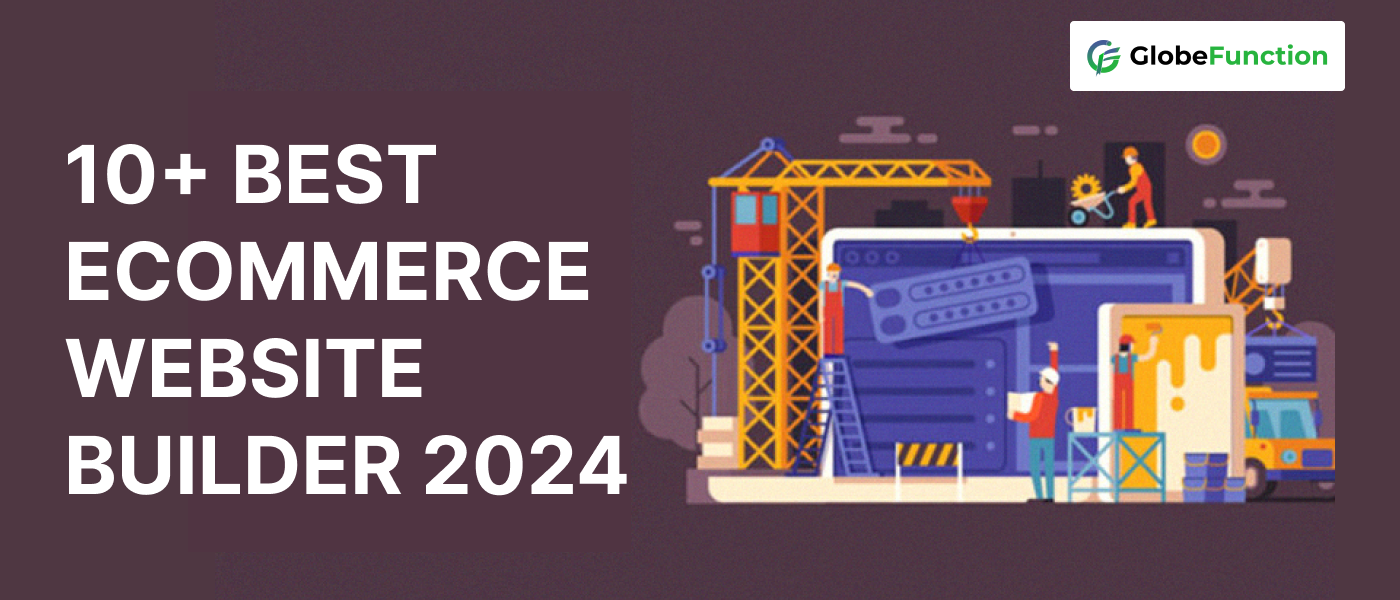Introduction
Ready to boost your online shop this year? We’ve got something exciting for you – the “10+ Best Ecommerce Website Builders for 2024.” Ever wondered which online store platforms can make your business shine? Stick around, and we’ll introduce you to the top picks that can take your shop to new heights.
These website builders aren’t just for selling things; they’re like magic tools that make your online shop awesome. Want to know which one suits you best? Let’s dive in and find out!
We’ve made it super easy – no confusing stuff. We’ll break down each website builder, tell you what’s cool about them, and help you decide which is perfect for your ecommerce business. Our guide is like having a friend who knows all about online shops. So, let’s get started on this journey together and make your online store the coolest it can be !
For online stores, there are lots of easy to use website builders available to make your business stand out.
The top e-commerce website builders are listed in this guide.
Ecommerce Builder | Price Per Month |
GlobeFunction | ₹590 ($7) |
Shopify | ₹2914($29) |
Woocommerce | ₹1000($12) |
BigCommerce | ₹2914($29) |
Wix | ₹1333($16) |
Magneto | ₹832($9.99) |
Squarespace | ₹1500($18) |
Prestashop | ₹300($3.49) |
Duda | ₹300($3.62) |
Volution | ₹2625($31.50) |
Zyro | ₹400($4.99) |
Definition of Ecommerce Website Builders
An ecommerce website builder is a software tool that allows individuals or businesses to create their stores without needing extensive coding skills or technical expertise. These platforms typically provide a user interface and a variety of templates allowing customers to personalize and design their online stores according to their preferences.
Top 10+ Ecommerce Website Builders for 2024
1.GlobeFunction: A Complete Ecommerce Solution Software
2.Shopify:Best all-in-one ecommerce platform
3.Woocommerce:WordPress Users’ Top eCommerce Website Builder
4.Bigcommerce:Best for large scale businesses
5.Wix:provides a free website builder with premium e-commerce options.
6.Magneto:Best eCommerce Website Builder for Techy Business people
7.SquareSpace:Best eCommerce Website Builder for Eye-Catching Designs
8.Prestashop:Best User-Friendly eCommerce Solution
9.Duda:Best eCommerce Website Builder with API Integration
10.Volution:Ability of selling an infinite number of goods
11.Zyro:provides paid plans with limitless storage and bandwidth.
1. GlobeFunction
Overview
Take your business online effortlessly with GlobeFunction, a comprehensive e-commerce solution. Manage everything from creating your virtual store to overseeing multiple marketplaces—all in one convenient platform.
Key Features
- Easy Online Shop: GlobeFunction makes it super easy to sell your stuff on the internet.
- Your Style, Your Shop: You get to decide how your online store looks. It’s like picking the colors and decorations for your own shop.
- Sell Anything: Whether it’s things you can touch or digital stuff, you can sell pretty much anything you want.
- Get Paid Your Way: People can pay you in different ways—like using credit cards or UPI. It’s all up to them.
- Safe and Sound: When people buy from you, they don’t have to worry. GlobeFunction makes sure everything is safe and secure.
- Looks Good Everywhere: Your online shop looks good on phones, tablets, and computers. So, anyone can shop from anywhere.
- Add Extra Goodies: There are extra things you can add to your shop to make it even cooler.
- Show Up in Searches: Your shop can show up when people search online. More people can find your shop that way.
- See How You’re Doing: You can check out how many things you’re selling and what people like in your shop.
- Sell on Social Media: You can also sell your stuff on Facebook, Instagram, and other social places and manage them in GlobeFunction.
- Keep Things Organized: It’s easy to keep track of what people buy and handle returns if needed.
- Get Help Anytime: If you ever need help, GlobeFunction is there. You can chat with us or give them a call.
Pricing Plans
2. Shopify
Overview
Online retailers use Shopify, one of the most well-liked website builders, with over two million active users every day.
Select from more than 70 premium and free eCommerce themes. After that, use the drag-and-drop builder to personalize the layout and launch your online store.
Users can manage customer accounts, orders, inventory, and payments with Shopify’s centralized dashboard. Users can add functionality for abandoned shopping carts to the point-of-sale software.
An example of a Shopify online store is this one:
Up to five languages can be used for sales in online stores with customers around the world. Enterprise-level retailers, meanwhile, support up to 20 languages.
To make your eCommerce stores search engine friendly, make necessary edits to the title tags, meta descriptions, URLs, and image alt texts. To further support your SEO tactics, Shopify also automatically adds robots.txt files, the sitemap, and canonical tags.
Printful, ShipStation, and Snapchat Ads are just a few of the more than 4,000 paid and free apps available in the Shopify App Store.
For customers with inquiries or issues, Shopify provides live chat, phone, and email support around-the-clock. It also features a community forum and a help center.
Key Features
- Smartphone applications: Everywhere, at any time, users can use the Shopify mobile app to manage orders and access the Shopify dashboard. Additionally, the platform provides Shopify Inbox for customer chat and Shopify POS for offline transaction facilitation.
- automation of marketing: Shopify enables you to start advertising campaigns with email marketing tools, Facebook Ads, and Google Smart Shopping.
- Shopify Delivery:The platform’s built-in shipping suite offers cheaper shipping costs by partnering with numerous courier services, including UPS, DHL, and USPS.
- many gateways for payments: The platform supports more than 100 third-party payment gateways, such as PayPal and Authorize.net, in addition to Shopify Payments.
- support for multiple currencies:International currencies supported by Shopify Payments include the US dollar, Hong Kong dollar, and euro.
Pricing Plans
Shopify is a high-end platform. It charges $29/month, $79/month, and $299/month for the Basic Shopify, Shopify, and Advanced Shopify plans, respectively.
Free hosting, an SSL certificate, lots of storage and bandwidth, and the capacity to sell an infinite number of products are included with all plans. But you have to register a domain name yourself.
If you purchase a premium theme and plugins, your expenses might increase. Plugins can range in price from $5 to $20 per month, while premium themes cost between $150 and $350.
Most importantly, depending on your selected Shopify plan, additional transaction fees of 2%, 1%, or 0.5% will apply if Shopify Payments isn’t available in your nation.
Shopify offers a 14-day free trial even though it doesn’t have a free plan for online retailers.
To learn more about pricing details, click here
3. WooCommerce
Overview
Key Features
- Smartphone Apps: Those who are on the go can manage stores and handle orders with the WooCommerce mobile app for iOS and Android.
- multilingual assistance: More than 20 languages, including French, Danish, and Spanish, are supported by WooCommerce. You’ll be able to set up an online store that is multilingual.
- block products :To display products on different pages and posts within your website, use WooCommerce Blocks. Sort products by categories and change the display parameters, such as the number of rows or columns.
- many ways to pay: Numerous payment options are supported by WooCommerce, including bank transfers, checks, cash on delivery, and credit card payments. More than 100 payment gateways, such as PayPal and Apple Pay, are compatible with it.
- support for multiple currencies: Sell to clients worldwide by utilizing WooCommerce Payments. Customers can view prices and make payments in their local currencies with this feature.
Pricing Plans
For $11.59 per month, you can get 200 GB of SSD storage and limitless bandwidth with our Woo Premium plan. It also helps you save some upfront costs by providing daily backups valued at $25.08.
4. BigCommerce
Overview
Key Features
- Third-party integrations:Via its official marketplace, BigCommerce provides hundreds of third-party integrations.
- smartphone application: The BigCommerce mobile app, compatible with iOS and Android, allows you to manage your online stores from any location.
- filtering of products: Enhance the user experience by enabling customers to quickly browse products based on a variety of criteria, such as color, size, price, and reviews.
- many gateways for payments: BigCommerce offers more than 60 payment options, including PayPal, Apple Pay, Stripe, and Amazon Pay, and it operates in more than 200 countries.
- support for multiple currencies: Global transactions are made easier by the eCommerce builder’s acceptance of payments in more than 100 currencies.
- selling across multiple channels: Sell products online on well-known social media sites and marketplaces like eBay, Google Shopping, and Amazon.
Pricing Plans
5. Wix
Overview
Key Features
- drag-and-drop editor : allows users to easily create and customize their websites without the need for coding skills. This makes it suitable for both novice and experienced users.
- large library of templates: giving users a variety of design options. These templates cover a wide range of industries and can be tailored to individual preferences and brand aesthetics.
- range of add-ons and extensions: enhance website functionality. Users can customize their websites with a variety of apps ranging from e-commerce tools to social media integrations.
- Wix ADI (Artificial Design Intelligence): For users who prefer a more automated approach, Wix ADI assists in the creation of a website by asking a series of questions and generating a set of recommendations.
Pricing Plans
5. Magento
Overview
Key Features
- purchase right away: Magento offers returning customers the option to skip some steps in the checkout process by using previously stored shipping and payment details.
- multilingual assistance:Installing language packs will allow you to modify the store view locale, add a store view, and add another language to your store.
- support for multiple currencies: Over 200 different currencies are supported.
- support for multiple stores: Manage several eCommerce websites and storefronts with Magento from a single admin dashboard.
- Many options for making payments: Payment gateways such as PayPal, Klarna, Braintree, and Amazon Pay are supported by Magento. Additionally supported are cash on delivery, bank transfers, money orders, purchase orders, and zero subtotal checkout.
Pricing Plans
6. Prestashop
Key Features
- automation of marketing: You can effectively engage with customers and automate your marketing campaigns with PrestaShop’s seamless integration with Klaviyo.
- automated advertisements: By using PrestaShop Social, you can increase your reach and draw in potential clients by running automated advertisements on well-known websites like Facebook and Instagram.
- Integration of payments: PrestaShop offers your customers a simple, safe, and fee-free payment experience by supporting a number of payment gateways.
- Effective shipping solutions: Use eShip for PrestaShop to expedite your shipping procedures and give your customers dependable, on-time order delivery.
- extensive analytics instruments: Use PrestaShop Metrics’ sophisticated analytics and reporting features to gain insightful knowledge about your customers’ behavior and sales performance.
Pricing Plans
7. SquareSpace
Overview
Key Features
- creator of logos. Create a logo for your eCommerce store quickly and easily by entering your business name into the Squarespace logo maker.
- smartphone application. You can edit your online store on a mobile device with the Squarespace mobile app, which is available on iOS and Android. You can write posts, edit pages, add new images, check site analytics, and manage orders and inventory while on the go.
- promotional instruments. Use digital marketing tools like social media integrations, email campaigns, and user-friendly banners to advertise your company. Additionally, users are eligible for a $100 Google AdWords credit.
- multiple payment providers from third parties. PayPal, Stripe, Apple Pay, and Afterpay are the four payment gateways that it uses to facilitate transactions.
- support for multiple currencies. Squarespace enables users to take payments in more than 20 currencies, such as Thai Baht and Indonesian Rupiah.
Pricing Plans
8. Duda
Overview
Key Features
- alignment with outside registries. Having this feature makes inventory management easier. Catalog management is streamlined by this synchronization if you have a large number of products from different suppliers.
- store customization via an API. Use APIs to add distinctive features to your web stores. By meeting industry and customer demands, businesses can create a truly bespoke eCommerce experience with the help of this advanced customization.
- gift cards and coupons. To help draw customers, develop and oversee promotional strategies from the store management area.
- Scheduler for deliveries and pickups. In addition to offering a variety of fulfillment choices, Duda gives customers the option of in-store pickup or delivery.
- More than forty payment processors. Customers are able to pay using the methods of their choice thanks to services like Stripe and PayPal. Additionally, users can approve credit card payments.
Pricing Plans
9. Volusion
Overview
Key Features
- Store Design: To create aesthetically pleasing and responsive online stores, Volusion offers a range of customizable templates. Layouts, fonts, and color schemes can all be changed by users to better reflect their brand.
- Product Management: The platform facilitates multiple product options, including size, color, and more, and makes it simple to upload products and manage inventories. Moreover, it makes it easier to create product categories for more efficient navigation.
- Payment Integration: Volusion offers businesses the flexibility to securely accept payments by integrating with a number of payment gateways. Major credit cards, PayPal, and other widely used payment options are supported.
- Security: Volusion places a high premium on security. To guarantee safe transactions and client data protection, the platform has SSL certification. Security updates are applied on a regular basis to protect against possible threats.
Pricing Plans
11. Zyro
Overview
Key Features
- AI Integration: Zyro is an AI website builder that uses artificial intelligence to help users quickly create websites. To speed up the process of creating a website, this also involves automated content creation and design recommendations.
- Templates: Zyro offers an assortment of editable templates fit for a range of uses and sectors. These templates are easily customizable by users to fit their brand identity and style.
- Online shopping Functionality: Zyro has e-commerce capabilities that make it simple for users to create online stores. Order tracking, safe online payments, and product management are all included in this.
- Drag-and-drop Editor: Users can easily arrange and customize website elements with the platform’s user-friendly drag-and-drop editor. This guarantees a simple, eye-catching design process.
- SEO Tools: Zyro incorporates SEO tools to assist users in search engine optimizing their websites.
Pricing Plans
Important Factors of Choosing the Right Ecommerce Website Builder
Conclusion
Frequently Asked Questions (FAQs)
Evaluate your technical proficiency, budget, scalability needs, and desired features to make an informed decision.
While most platforms have transparent pricing, be vigilant about potential additional costs for plugins, themes, and transaction fees.
Yes, migration is possible but may come with challenges. Seek expert advice for a smooth transition
Ecommerce website builders prioritize security through SSL certificates, data encryption, and regular updates.
GlobeFunction is often recommended for its user-friendly interface and extensive support.














